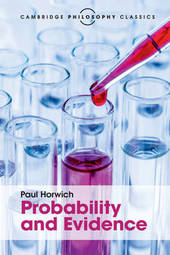
|
Probability and Evidence
Paperback / softback
Main Details
| Title |
Probability and Evidence
|
| Authors and Contributors |
By (author) Paul Horwich
|
| Series | Cambridge Philosophy Classics |
|---|
| Physical Properties |
| Format:Paperback / softback | | Pages:146 | | Dimensions(mm): Height 231,Width 153 |
|
| Category/Genre | Probability and statistics
Philosophy of science
History of science |
|---|
| ISBN/Barcode |
9781316507018
|
| Classifications | Dewey:501 |
|---|
| Audience | | Professional & Vocational | |
|---|
| Illustrations |
5 Tables, black and white; 10 Line drawings, unspecified
|
|
Publishing Details |
| Publisher |
Cambridge University Press
|
| Imprint |
Cambridge University Press
|
| Publication Date |
26 August 2016 |
| Publication Country |
United Kingdom
|
Description
In this influential study of central issues in the philosophy of science, Paul Horwich elaborates on an important conception of probability, diagnosing the failure of previous attempts to resolve these issues as stemming from a too-rigid conception of belief. Adopting a Bayesian strategy, he argues for a probabilistic approach, yielding a more complete understanding of the characteristics of scientific reasoning and methodology. Presented in a fresh twenty-first-century series livery, and including a specially commissioned preface written by Colin Howson, illuminating its enduring importance and relevance to philosophical enquiry, this engaging work has been revived for a new generation of readers.
Author Biography
Paul Horwich is Professor of Philosophy at New York University. He is best known for his contributions to the philosophy of science, including a probabilistic account of scientific methodology. His most recent publications include Wittgenstein's Metaphilosophy (2012) and Truth - Meaning - Reality (2010).
Reviews'... the strongest and most influential parts of Probability and Evidence are Horwich's solutions to various puzzles about scientific reasoning ... the book might very well still be of considerable interest to those who are looking for an engaging and readable introduction to the topic of scientific reasoning from a Bayesian perspective.' Finnur Dellsen, Metascience
|